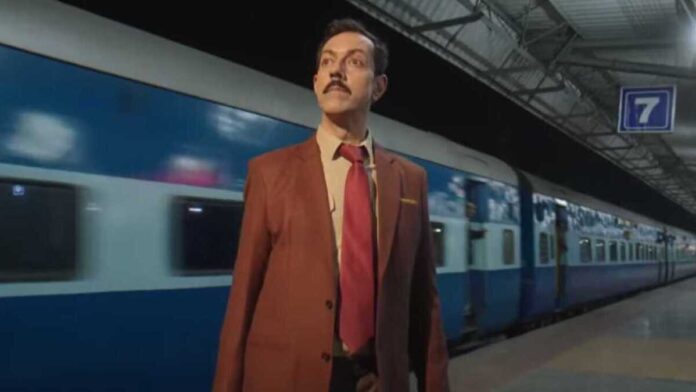Down on his luck, filmmaker RK (Rajat Kapoor, playing a version of himself) has created a movie which is supposed to be a throwback to the films of the 60s and 70s. In “Rk/Rkay,” he plays a Muslim hero named Mehboob, stuck in a very pulpy premise (at least that’s what it seems) where he runs afoul of gangsters led by a scenery-chewing Ranveer Shorey. In the real world, RK is at his editing bay, and the horror faced by every filmmaker is now grabbing him by the throat — it isn’t the film he envisioned, there are pacing issues, and even his assistants believe that he shouldn’t have acted in the movie, but it isn’t as atrocious as his last feature (words no director wants to hear). It becomes a matter of unprecedented crisis when Mehboob escapes from the reel to the real world, and RK is now forced to deal with his producers, assistants, and, of course, his creation while trying to pull the sinking ship of his film to the shore.
Rajat Kapoor has always tried to experiment, not playing by any of the commercial rules of film in terms of story. The fact that he is creating a meta-narrative about a director-actor isn’t surprising in the slightest. What is surprising is how funny and self-aware it is at times. It never really shies away from its farcical tonality and cheeky self-deprecating nature. It never ceases to poke fun at the minutiae of filmmaking, especially the egotism of most characters involved in the filmmaking itself. From the writer-filmmaker who has written the characters and the narrative and thus his sense of ownership exhibits signs of grandiosity within, or the actress who would prefer an extra thirty minutes of readying herself before entering the shot, reliant on assistants to feed her lines in as ridiculous or hilarious a situation as possible, or the director who advises his talented actor to improvise because his brief about the antagonist is simply “unpredictable.” This later comes to bite him in the rear.
But the egotism of these real-life characters hits a wall when they are faced with the sincerity of the characters who leap off the screen. It is incidental how the lines become blurred. It’s more compelling to witness how these characters, whose definitions are enough to be showcased in a thinly veiled kitschy homage film, transition from sketchy to definite when they travel to the real world. For these characters, entering and exiting a taxi lasts just a second. For them, the sharp cut from one location to the next is their version of reality, which slowly gets broken as they are forced to realize the density of distance, time, and even emotion. And as these revelations occur for them, the artificial yellowish glow surrounding them like a bright halo slowly starts to fade – reel slowly trickling into reality. These revelations are made through hilarious gags and poignant conversations, mostly via interactions between the creator and its creation, or the creation interacting with the creator’s family. In a way, the creation (Mehboob) is an assemblage of some aspects of the creator’s given shape, aspects that the creator himself has stopped using, which causes RK’s jealousy to flare up when he sees his wife sympathizing with Mehboob. There are funny and tender moments, strung together with moments of farce and hard-hitting emotional revelations. When Mehboob finally gets a taste of reality and doesn’t want to go back to the narrative laid out for him, which ends in his death, that is another significant layer Kapoor, as a director, is imbibing into an already dense but surprisingly not convoluted screenplay. There are moments where the suspension of disbelief is really hard to buy, and the lack of explanation on how the characters can walk to and fro between the reel and the real world, or why there isn’t a concerted effort to stop the same. “RK/RKay,” in its exploration of its philosophical and existential ideas, feels indulgent at times, and even talks in circles about ideas the film finds far cleverer than it truly is.
What works for the film, however, is its lighthearted tone, which allows the film to skip over its explanations and go with the flow of the story rather than getting bogged down in the minutiae. Rajat Kapoor excels at distinguishing key aspects of RK and Mehboob so that the two distinct characterizations stand out. Chandrachoor Rai, as the assistant director with no filter and a lackadaisical attitude, is hilarious. Manurishi Chadda, the producer with a background in construction, always carrying a black label whisky bottle and a believer in happy endings, manages to jolt the narrative with urgency, as if to slap it back to focus. Thus, even while its ending becomes predictable, “RK/RKay” is a breath of fresh air with a narrative twist unique and fun enough that you won’t feel short-changed.

